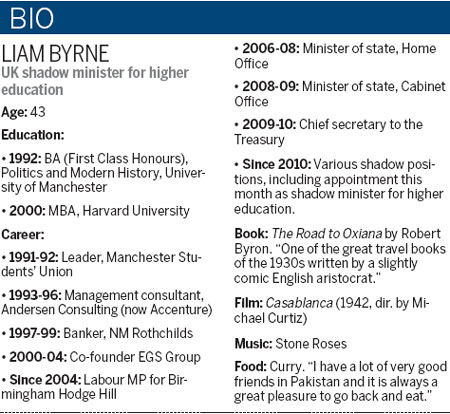Country at center of a new age
Updated: 2013-10-18 09:47
By Andrew Moody (China Daily Europe)
|
|||||||||||
UK politician thinks China is one of the most innovative places
Liam Byrne believes China is set to be at the center of a new Age of the Enlightenment over the next 20 years.
The ex-British cabinet minister and author of a new book, Turning to Face The East: How Britain Can Prosper in the Asian Century, says the former Middle Kingdom is entering an exciting new dawn.
"If Adam Smith (a leading Enlightenment figure) was writing The Wealth of Nations today he would base it on Foxconn City (where Apple and products for other tech giants are manufactured) in Shenzhen because of its pace of production and world-class innovation," he says.
"I think China is one of the most innovative places on Earth right now. Many people believe that China will produce the next Silicon Valley."
Byrne, who was appointed earlier this month as shadow minister for higher education, was speaking in the lobby of Portcullis House in Westminster. He was hitting back at those such as Will Hutton, who argued in The Writing on the Wall: China and the West in the 21st Century, that China lacked the institutions to have its own Enlightenment period that defined Europe's progress in the 18th century.
Byrne actually had a drink with the former editor of The Observer newspaper when he bumped into him in a bar at Oslo airport, which he refers to in his book.
"I think it's a much overrated problem (lack of institutions). I think the Chinese leaders have been very adroit at making the right adjustments at the right time," he says.
Byrne was chief secretary to the Treasury in former prime minister Gordon Brown's Labour government and famously left a memo to his successor saying he was "afraid there is no money" left.
He decided to write the book because of a growing realization that China could be a vital market for the UK in the wake of the financial crisis just as a resurgent Europe proved after the end of World War II.
"My starting point was trying to answer the question of how Britain was going to pay its way in a world where China was the largest economy.
"I also felt that China is hugely misunderstood in Europe, in general, but in Britain, in particular. As someone who has traveled a little to China now and has worked with Chinese politicians for six or seven years, I wanted to share what I had learnt."
Byrne makes the case that while countries such as Germany through companies like Siemens have been successful exporting to China as it has developed its infrastructure, the next phase of the country's growth could benefit Britain.
"China needs to build a social safety net, China needs to become a world leading science power and China needs to diversify a lot of its foreign exchange away from US Treasury bills. Britain can help with an awful lot of that. We are past masters of soft infrastructure such as legal systems, asset management and we could help China build that social safety net."
He makes the case Britain has been left in Germany's trail in its dealings with China for more than a decade.
Byrne, who took a first in politics and economics at Manchester University, where he was also a student leader, first encountered China when he worked on Hong Kong Telecom for Andersen Consulting (now Accenture) in the early 1990s.
Then in 2006 as a minister of state in the Home Office, he visited China dealing with issues around asylum seekers and organized crime.
"Coming back (from that trip) I realized that as a British politician I knew nothing about this country that was soon going to become the biggest economy on Earth," he says.
The book, which provides impressive analysis on China for which he acknowledges help from some of Britain's leading China experts, including the UK foreign office's China team, is evidence he has since redressed that knowledge deficit.
He says there is a tendency in the West not to give full credit to the giant leap China has made since reform and opening up in the late-1970s.
"It has been hugely successful and it has been faster than anyone anticipated, much faster, in fact," he says.
He says, however, that the recent nervousness in the financial markets about China's slowing growth is indicative of the fact that people were ignorant of the government's long-term strategic approach to policy.
"The (concept of the) five-year plan is not very well understood in the West. People don't pay attention to it or read it properly," he says.
"A lot of the anxiety about the slowdown in growth was very easily answered by simply pointing to the plan and say that is what Chinese leaders said was going to happen."
He says that it might take a historic event such as China becoming a bigger economy than the United States ending its more than 100 years in pole position to change perceptions.
"I think this will be a huge moment and I think it is important that Americans and American politicians, in particular, react in a cool-headed way," he says.
Byrne, however, does feel that there will have to be reform of the post-World War II Bretton Woods institutions such as the World Bank and the International Monetary Fund.
"China is now doing something very clever in building new institutions to sit alongside the Bretton Woods settlement. The BRICS bank, for example, may be more powerful than the IMF or the World Bank over the next 10 years. China will be helping steer that in a big way," he says.
Byrne, who now teaches a class to students from leading Chinese banks at the Said Business School at Oxford University, believes there needs to be more focus on China in the UK education system. He is currently exploring private Chinese lessons for his 13-year-old son. "It is a big challenge for our education system. When a friend of mine asked the education secretary how many qualified Mandarin teachers we had in British schools he didn't know," he says.
Byrne says he has had recent discussions with educators trying to develop an A-level course in Chinese civilization but they are finding it "tough to get it off the ground".
"Our history (of China) is very poor. We have kind of airbrushed the evils of opium out of our collective memory," he says.
He is also keen to see more participation by the Chinese community in UK elections and he is about to take part in public events with Chinese for Labour, an organization affiliated to the Labour Party.
"I want to encourage the Chinese community in Britain to become more involved in politics because it is politics that allows us to make decisions together as a country," he says.
Byrne, who is also on the board of the Great Britain-China Centre, which aims to promote links between the two countries, says that from a personal perspective China will now define the rest of his life.
"Whenever I can, this for me is going to be part of my life's work in politics," he says.
andrewmoody@chinadaily.com.cn
|
Liam Byrne says there is a tendency in the West not to give full credit to the giant leap China has made. Nick J. B. Moore / for China Daily |

(China Daily European Weekly 10/18/2013 page32)
Today's Top News
Scientists requested government to plant GM crops
Travelers to Europe bypass attractions of Brussels
Li urges greater effort on reforms
'Constructive ideas' on thorny issues needed
US deal key to nabbing fugitives
JPMorgan, DOJ reaches $13b deal
As China's economy grows, so does reform call
Expanded property tax trials predicted
Hot Topics
Lunar probe , China growth forecasts, Emission rules get tougher, China seen through 'colored lens', International board,
Editor's Picks

|

|

|

|

|

|






